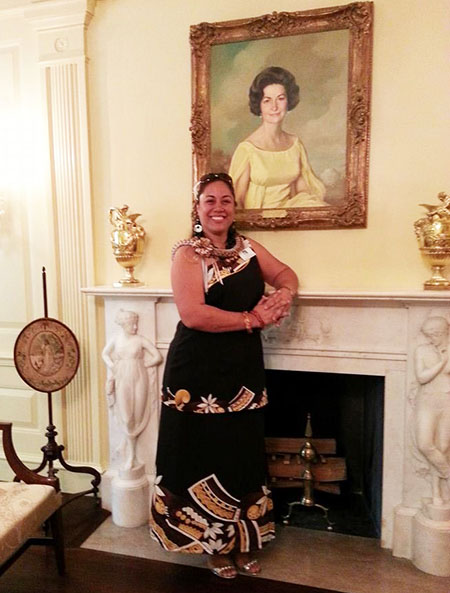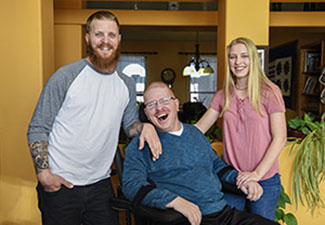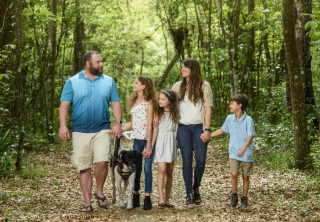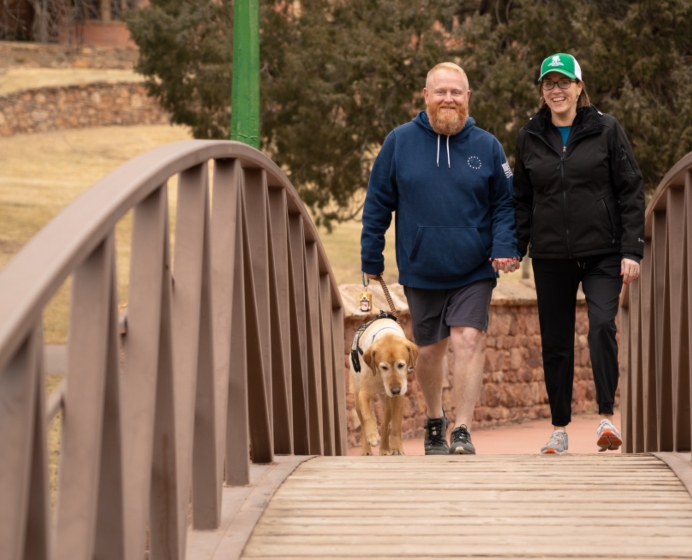Military Caregiver Finds Hope Through Wounded Warrior Project’s Independence Program and WWP Partner Organizations

Wounded Warrior Project® (WWP) believes caregivers of post-9/11 service members and veterans have unique needs that will increase as the veterans they care for age.
The 2024 RAND report, America’s Military & Veteran Caregivers: Hidden Heroes Emerging from the Shadows, shows that caregivers of post-9/11 veterans need more mental health and financial support than any other caregiving group. That’s why WWPTM provides crucial care and long-term support for our nation’s most severely wounded warriors and their caregivers, like Shannon and Sualauvi (Sua) Tuimalealiifano.
Learn more about the 2024 RAND Report.
Meet Shannon and Sua
Shannon and her husband Sua are Army veterans who met at Fort Liberty, North Carolina, while they were active-duty soldiers.
The young couple enjoyed the support of living in a military community and were ready to make sacrifices. Shannon, a trained combat medic, worked in a lab at Womack Army Medical Center. Her experience in the military helped prepare her and their family for Sua’s deployments with Army Special Forces as a paratrooper, jumpmaster, and Special Operations soldier.
But after Sua’s injuries in combat, nothing could have prepared Shannon for the exhausting work of being a full-time caregiver while raising three children, who were 6, 4, and 9 months old at the time.
Things were happening fast, and adjusting to the severity of Sua’s injuries was difficult. Sua was thrown out of his vehicle during a firefight and slammed on his back. He heard something snap but was pulled back into the vehicle and continued to fight. It wasn’t until a few weeks later that he lost mobility – he had broken vertebrae and a spinal cord injury. He could no longer move from the waist down. After surgery to stabilize his spine, he also lost the use of his upper body and became quadriplegic.
Within a week of Sua’s medevac from Afghanistan, Shannon joined him at Walter Reed National Military Medical Center for first-line care and then at James Haley VA Hospital in Tampa, Florida, for polytrauma and neurological rehab. Shannon’s parents helped care for the children so she could focus on Sua’s care.
“I was still in shock. I didn’t know where to look for help,” Shannon said. “I was focused on him and didn’t know yet how much help I would need.”
A Caregiver's New Reality
After almost two years in VA hospitals and physical rehab, Sua was finally discharged and returned home to Fort Liberty. He did not have the follow-up that Veterans Affairs (VA) would typically set up for a veteran because he was still on active duty and not yet medically discharged from the Army.
That meant Shannon and Sua returned home without a soft landing. Sua had to sleep on the living room floor the first night because their house was not accessible. His wheelchair didn’t fit through the doors, and he couldn’t access the bedroom or bathroom on his own.
At the time, Fort Liberty didn’t have the medical specialties to help rehab a quadriplegic soldier with a spinal cord injury. Not knowing how long a medical discharge would take, Shannon and Sua asked for a compassionate reassignment to move to Hawaii, where Sua’s family lives. This move allowed Sua’s family and community to offer support for the couple and their children.
In Hawaii, his friends built an outdoor shower for Sua and adapted doorways to his wheelchair’s width. Sua's parents and siblings helped him with additional therapy at home, but even with strong family support, things were still intense.
Shannon remembers doing Sua’s catheter changes every four hours around the clock and getting up in the middle of the night with the youngest child. Without any respite, exhaustion and sleep deprivation eventually caught up with her.
“I broke apart,” Shannon said.
Caregiver Burden Turned Into Hope
The round-the-clock responsibilities and constant worry understandably took a toll.
“After almost two years in Hawaii, I had a nervous breakdown,” Shannon recalled. “I struggled with accepting help.”
“When you’re used to being a stronger person and being independent, you take everything on. It can be unhealthy.”
At that point, Shannon and Sua realized they needed to take the next step in care—not just for his recovery but also for Shannon’s well-being.
“It was Wounded Warrior Project that saved me after the breakdown,” Shannon said. “They flew me (from Hawaii to Florida) for an equine therapy program with other caregivers. It was lifesaving and life-giving.”
That pause allowed Shannon to see how much she needed to be around other military caregivers. “That was nourishing to me,” Shannon said. “We were able to cry together and share with each other what we couldn’t share with our spouses. We now had the advantage of leaning on each other – it saved my life.”
When Shannon looked back, she realized she had started to have suicidal ideation. She felt trapped mentally. “I didn’t see a way to change the situation, but acknowledging my mental state was important,” Shannon reflected.
Finding Relief with WWP's Independence Program
After attending the caregiver program, Shannon learned about WWP’s Independence Program, which opened new doors for her and Sua.

The Independence Program provides long-term support for veterans with traumatic brain injuries, spinal cord injuries, and neurological conditions –– live as independently as possible. By working with warriors, families, and caregivers, WWP helps craft care plans and goals that fit individualized objectives and help warriors develop a renewed sense of purpose.
For Sua, the Independence Program provided physical therapy and fitness-related activities like stretching, weightlifting, and riding an adaptive bike. He’s into adaptive rugby, so practicing on the rugby wheelchair is on his program agenda. He also receives help learning to independently perform household tasks like laundry and grocery shopping. WWP’s Independence Program also provides him with massage therapy to help reduce pain and muscle stiffness.
For Shannon, the Independence Program connected her with other caregivers online and introduced her to supportive partner organizations that allowed her to feel less alone.
As a couple, WWP’s Independence Program assists Shannon and Sua in planning for the future. This long-term care planning helps ensure their family's needs are met even if support from a caregiver is no longer available.
Achieving Independence and Engaging in Community
With new tools to empower them, Shannon and Sua moved back to Tampa, where polytrauma assistance was available.
“We felt the support was tangible in Tampa. We decided to go where there’s a family-like environment,” Shannon said.
“Sometimes, the next step is not what you thought it would be,” she said. “We had to choose to either be near family or have access to medical support. Sometimes military families must come to terms with the fact that what they assumed would work isn’t the best situation.”
Outside of the military, I see my fellow caregivers as my soldiers… I want others to know that it’s going to be OK even if it isn't OK yet.
Shannon continued her growth in Tampa and found purpose in mentoring other caregivers. Eventually, she translated her experiences into The Rosie Network’s entrepreneurial program, which empowered her to create a conceptual veterans’ village to nurture and support military heroes and their families.
“The way I see it, mentorship of caregivers helps individuals, and building a warrior village helps whole communities,” said Shannon.
“Sua and I continue to help other families, and it helps us find purpose,” Shannon said. Sua mentors other veterans through adaptive sports, and Shannon continues to work with Hidden Heroes, part of the Elizabeth Dole Foundation, to support other military families in the Tampa area.
“In the military, we were non-commissioned officers, and we led and trained other soldiers,” Shannon said. “Outside of the military, I see my fellow caregivers as my soldiers… I want others to know that it’s going to be OK even if it isn't OK yet.”
If you are a caregiver to a post-9/11 veteran or know a wounded warrior in need, learn more about WWP’s Independence Program or the mental health services available to veterans and military caregivers.
Learn more about WWP's mental health services for veterans and military caregivers.
Contact: Krissty Little – Public Relations, klittle@woundedwarriorproject.org, 904.760.6957
About the RAND Report
The 2024 RAND report, America’s Military & Veteran Caregivers: Hidden Heroes Emerging from the Shadows, is the most comprehensive study ever conducted on today’s military and veteran caregivers and their families. As a lead funder, Wounded Warrior Project® (WWP) understands that caregivers go above and beyond for warriors, and our priority is to ensure both groups live with hope and purpose.
About Wounded Warrior Project
Since 2003, Wounded Warrior Project® (WWP) has been meeting the growing needs of warriors, their families, and caregivers — helping them achieve their highest ambition. Learn more about Wounded Warrior Project.


